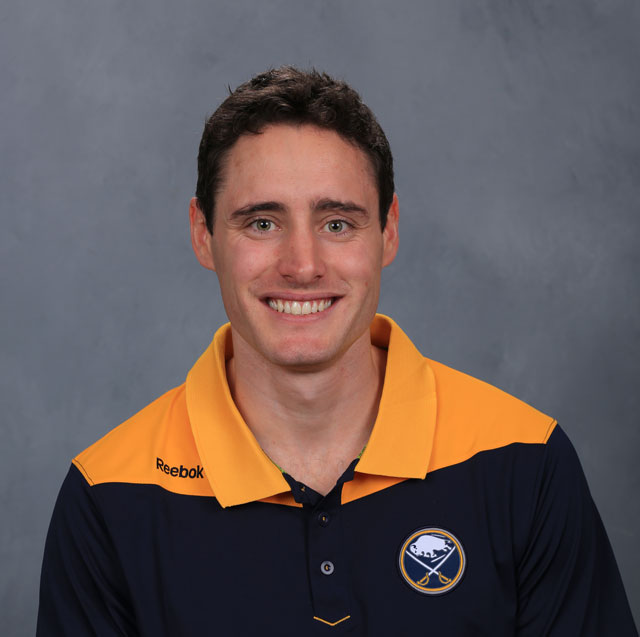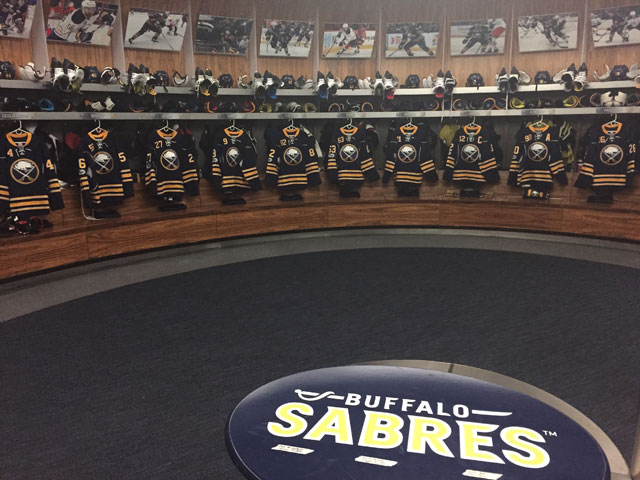No skating on thin ice for UC PhD graduate

‘Fast-paced, high-contact, team sport’ could describe either rugby union or ice hockey and University of Canberra PhD graduate Dean Higham is finding his rugby experience is helping in his new career in the United States.
Dr Higham has taken up a role as an applied sport scientist in Buffalo, New York with the Buffalo Sabres National Hockey League (NHL) team, but it’s a far cry from where he started out.
“My own skating skills are rusty; getting going isn't a problem, but stopping is a different issue. Thankfully, being an NHL-level skater was not a pre-requisite for the position,” Dr Higham joked.
Dr Higham commenced his PhD at the University of Canberra in 2009, while working at the Australian Institute of Sport (AIS). His research focused on athletic development and performance analysis with the Australian national rugby sevens program.
“It was exciting when in October 2009 rugby sevens was added to the program for the 2016 Olympic Games in Rio de Janeiro. My work aimed to help Australia’s rugby sevens teams improve their performance, now they had the opportunity to compete for Olympic gold.
After graduating, Dr Higham moved to Toronto, Canada and embraced the ice hockey culture.
I found there were some similarities between ice hockey and rugby, having played rugby while at university and studied it closely for my PhD.
“They’re both fast, contact-based team sports, and if I’d grown up in Canada I would have been playing ice hockey rather than rugby,” he said.
“The skills and experience I gained completing my PhD and working at the AIS and Australian Rugby Union with professional and Olympic athletes translates to the challenging demands of supporting a professional ice hockey team in the NHL.”

Dr Higham works with the Sabres on athletic development with the team’s strength and conditioning coaches, injury-risk minimisation and return-to-play protocols with the medical staff, nutrition interventions with the dietitian, and managing training loads and recovery with the coaches.
"During my PhD, I was fortunate to already have an intimate understanding of rugby union. The challenge was gaining a similar understanding of hockey and the unique demands of the NHL."
He identifies one of the key challenges is managing the recovery of the players to allow them to play at their best during the team’s 82 regular-season games, which require players to frequently travel all over the US and Canada.
The ability to support and research national-team athletes through my PhD program and the close affiliation between the AIS and UC provided me with experience that has proved invaluable in creating opportunities to work abroad.
“While I’m focused on supporting the Buffalo Sabres as they continue to improve and push toward the play-offs and to win the Stanley Cup, I continue to learn from coaches, and medical and science practitioners, gaining the experience that one day, I hope will allow me to lead a science and medicine team,” Dr Higham said.
Words by Marcus Butler, images courtesy of Dean Higham
 | Dean HighamPhD in Applied Science, University of Canberra (2014)Dean Higham graduated from the University of Canberra with a PhD in Applied Science. He has worked as a Sports Scientist for the Australian Rugby Union and as a Sports Physiologist at the Australian Institute of Sport. Dean currently works in New York as an Applied Sport Scientist for the Buffalo Sabres. You can connect with Dean via LinkedIn. |

